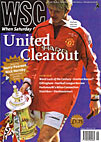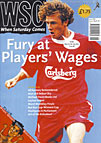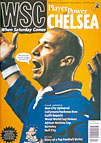 Dear WSC
Dear WSC
I have no time at all for deposed Rangers vice-chairman Donald Findlay, but Gary Oliver’s article about him (WSC 149) was unfair in two respects. Findlay is Scotland’s pre-eminent defence counsel. He has defended scores of people accused of rape, murder, etc – including many Catholics. To extract from his long career two cases where the victims were Celtic fans is a distortion. And Findlay’s admittedly ill-judged joke that his birthday should have been on July 12th rather than St Patrick’s Day was a mutual one he had with a Catholic friend whose birthday is on the former date. The good news is that Rangers chairman David Murray has, by getting rid of Findlay, again taken strong action against sectarianism.
Ian McLean, Glasgow
Search: ' Dumbarton'
Stories
 Suggestions of selling their promotion place and moving to Dublin are just two of a number of outrageous plans outlined by the current Clydebank owners writes David Munro
Suggestions of selling their promotion place and moving to Dublin are just two of a number of outrageous plans outlined by the current Clydebank owners writes David Munro
In WSC No 134, the proposed move of Clydebank to Dublin was described as “one piece of franchising too far”. Little did we know then that the next 12 months would see the club’s fate take even stranger twists, leaving its board hopelessly divided, its future home no clearer and its fans consumed with rage.
 Clydebank are the latest Scottish club to encounter financial difficulties. Colin McPherson analyses what the future holds
Clydebank are the latest Scottish club to encounter financial difficulties. Colin McPherson analyses what the future holds
Stop me if you’ve heard this before: Small, modestly successful Scottish club, relatively new to the League, finds itself asset stripped, relegated and threatened with a move to another part of the footballing world, without a care for their loyal band of long-suffering supporters.
 Doug Stenhouse offers his predictions for the forthcoming season
Doug Stenhouse offers his predictions for the forthcoming season
Imagine a club in your league makes up a new rule to dissolve the competition as it stands and form a new league expelling five clubs. Imagine all the clubs are circulated with the proposal except the five to be expelled. Couldn’t happen? It has happened before: this is exactly what Glasgow Rangers tried to do in Scotland at the end of 1965-66. The five were Stranraer, Albion Rovers, Berwick Rangers, Stenhousemuir and Brechin. Only a last ditch court room battle and intense lobbying by Berwick chairman George Shiel won the day. A costly result for Rangers as two years later they lost to lowly Berwick in the Scottish Cup.
 Dear WSC
Dear WSC
It’s hard to say which of the many depressing scenes from Channel 4’s Football Dreams documentary carried the most negative message for the future of the English game. Was it the sight of the Chelsea YTS kids spending their days scrubbing boots and cleaning toilets instead of playing football? Or the tin-pot sergeant-major’s approach favoured by coach Graham Rix, so reminiscent of bullying school teachers? Or perhaps it was the lack of self-confidence and immaturity of the boys themselves, reduced to mumbling self-pity by Rix’s ranting? It seems to me that the responsibility of the club towards YTS trainees is two-fold. First, to equip the players who are taken on as professionals with the skills to cope with the game at the highest level. Second, to give the ones who will be rejected the best possible chance to make a different career for themselves. It would be nice to think that the kids received some practical training in something useful (as they are compelled to do in other countries, such as Germany). But in essence the two jobs come down to the same thing: teaching the youngsters to think and act for themselves, whether on or off the football pitch. It seemed that at Chelsea all they were trained for was to follow orders, and the more ridiculous the orders were, the more slavishly they were enforced. True, the programme was made a year ago. Perhaps since then Ruud Gullit has encouraged a more enlightened regime, which encourages the trainees to question their coaches and develop their own judgment as he did himself in Holland. But if this is how things are done at the club which has been most receptive to continental influences and systems of play which depend on a certain degree of intelligence, then what on earth are the rest of them like?
Colin Sullivan, Lincoln